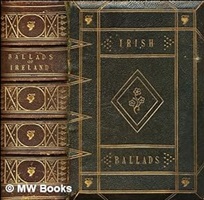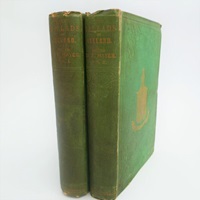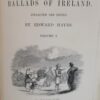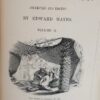|
Edward Hayes
Life
[?1800-?]; compiler of The Ballads of Ireland, 2 vols. (1855), and num. editions.
Works
| Ballads of Ireland (editions) |
- The Ballads of Ireland; Collected and Edited with Notes Historical and Biographical, 2 vols. (Edinburgh & London: A Fullarton 1855), Vol. I: xxxix [Intro.], 356pp.; Vol. II: viii, 419pp. [engrav. front., pls., and t.pp.; green cloth board dec. with coat of arms; ded. Gavan Duffy, Esq., MP; first edn.; Vol. I: t.p. engraving of “The Emigrants” (p.308); Vol. II: t.p. engraving of “The Flight to Cyprus” (p.227)]; Do. another edn. (Edinburgh: Fullerton [1869]), 2 vols., 19cm. [added t.p. 1855].
- Do. as The Ballads of Ireland, collected and edited by Edward Hayes, Vol. 1 (Boston: Patrick Donohoe, 23 Franklin St. 1857), 348pp. [Dedication (p[5]); Contents (p.7-12); Intro. (p.1); Descriptive Ballads (p.41); Historical Ballads (p.90); Political Ballads (p.263); Emigrant Ballads (p.300); Pathetic Ballads (p.319-49) [no index]; available at Internet Archive - online; also at Google Books - online]; & Do., Vol. II (Boston: Donohoe 1857), 380pp. [no Intro.], Ballads of Affections (p.11); Fairy Ballads (p.92); Legendary Ballads (p.152); Miscellaneous Ballads (p.203); Translated Ballads (p.347); General Index [with authors], 369-80; available at Google Books - online].
- The Ballads of Ireland: collected and edited by Edward Hayes [4th edn.] (Edinburgh, London; New York : Fullarton, MacNab & Co. 1859) [pref. dated 1855; Intro. by William Kenealy].
- Do. [5th edn.] (Dublin: James Duffy, & Sons [1869]), 10 pls. [ded. Charles Gavan Duffy and intro. by William Kenealy; signed wood engravs. by W. Bowman, Macpherson, and H.K., printed by Pattison Jolly, Dublin]; and Do. [another edn.] (Duffy [1890]).
|
Note: The 39pp. introduction is supposedly by William [q.v.; var. Kennealy]
|
Query: The Ballads of Ireland, collected and edited by Edward Hayes [1 vol.] (Boston: Alexander Moore 1856) [listed at WorldCat - online; assoc. the name of Fitz-james O"Brien and Edward Hayes, ed.]
|
|
Cover and title pages of Ballads (1st edn.1855).
Images by Ulysses Rare Books - online |
|
 |
| Cover of Ballads (1st edn.) bound as 2 vols. in 1. Images by MW Books (NY) at Abebooks - online. |
|
[ top ]
Quotations
| The Ballads of Ireland [1855] (US edn. 1857): |
| [ Note: The following introduction prefixed to Volume 1 of the first and subsequent editions is said to have been written by William Kenealy (q.v.) rather than Edward Hayes himself. Note that the Leeds address given in the Dedication coincides with the city in which Kenealy is said to have been living in 1855 prior to his return to Ireland. ] |
Dedication to Gavan Duffy: ‘Permit me to dedicate to you this collection of the Ballads of our native Country, — enriched as it is by some of your own admirable compositions. As no man living has more thoroughly identified himself with the native Literature of Ireland, and particularly with its Ballad Literature than yourself, I feel I am discharging a public duty as well as indulging a private feeling of the most heartfelt regard, in dedicating to you a volume, the materials of which, either directly or indirectly (to a very considerable extent at least) would probably never have existed but for you. / Believe me, by dear Sir, yours most sincerely, / EDWARD HAYES / [3] Blenheim Square, Leeds, 25th April 1855.’
|
‘If the absence of civil rights or religious freedom, or the struggle for their assertion, be a barrier to intellectual progress, Ireland may well be poor in literature to-day. Indeed the wonder is, how she has even a literature at all, when we consider the proscription of her intellect. Her history is one long series of warfare and disaster; and from the Battle of the Boyne to this hour, her energies have been absorbed either in struggles for religious liberty or in contests for political power.’ id.(p.14)
‘Moorish genius presented Spain with an Encyclopaedia of Science; while the Genius of Misrule presented Ireland with an Encyclopaedia of Horrors! Mahometan teachers invited Christian students to their schools and became their masters and their friends, while the Christian invaders of Ireland prohibited education under penalty of death.’ (p.18.)
‘Every country of Europe has her biography except Ireland. While other nations are rich in chronicle and memoir, she has few besides those which speak of her as a barbarous enemy. These are not the national records over which a people might well exult. The truest history of Ireland will be found in the stray ballads of her persecuted bards, and the memoranda of her banished monks.’ (p.21).
‘It was this persecution of the bards by Elizabeth and Cromwell, which led to the dreamy allegory in which national hopes were shrouded. Ireland was the poet’s [20] love but a jealous stepmother stood between him and his mistress. And so consistent were his political rhapsodies, on some occasions, with the wailings of the tender passion, that it is almost impossible to discriminate whether they were intended for his country or his mistress. Of this class is Mangan’s “Dark Rosaleen”, which some consider political [have here been] placed among the Ballads of the Affections.The very extravagance of the allegory employed on these occasions is an unmistakable index to the intensity of the persecution which produced it in the first place.’ (p.23).’ (Quoted [in large part] in Luke Gibbons, Transformations in Irish Culture, Cork UP 1996, p.20-21; and cf. Samuel Ferguson’s review of Hardiman’s Irish Minstrelsy in the Dublin University Magazine, during 1834 which occasions this defence.
‘Ireland did not manifest an indifference to the spirit of song in this day of her dolor, nor a want of taste for its cultivation. Still was she, as in the olden time, the mother of patriot bards; and though a price was set upon the minstrel’s head as well as upon the priest’s, every valley resounded with the praises of ancient heroes — elegies for the martyred brave dark curses for the native traitor and the ruthless stranger — proud invocations of the Genius of Liberty — and passionate aspirations for the glory and independence of Erin.’ (p.24)
‘The influence of the old bards on popular tastes and habits is still observable. Not many years ago the rustic schoolmaster was elected by a species of poetic tournament. A prize poem was generally the test of merit; and the successful candidate was chosen more for his skill in the muses than for his acquaintance with the doctrines of Political Economy. / The rage for street ballads is another trace of their influence. And so strict is the resemblance, in one respect, between the present and the past, that a collection of these ballads will be a versified record of the principal events of modem Irish history. But this is the only point of resemblance between them. The contemptible street ballad of to-day will not bear comparison with the racy, vigorous minstrelsy of old. ’ (p.25) [...] The contemptible street ballad of to-day will not bear comparison with the racy, vigorous minstrelsy of old.’ (p.26.)
‘The Irish love to make their country into a loving and beloved real being, they love to speak to it without pronouncing its name, and to mingle the love they bear it, an austere and perilous love, with what is sweetest and happiest among the affections of the heart. It seems as if, under the veil of these agreeable illusions, they wished to disguise to their minds the reality of the dangers to which the patriot exposes himself, and to divert themselves with graceful ideas while awaiting the hour of battle, like those Spartans who crowned themselves with flowers, when on the point of perishing at Thermopylae.’ (p.29.)
‘No nation can afford to despise its ballads. They are an important portion of its history — the first efforts of its civilization. And in the record of a nation’s ballads, we find the history of its progress and its triumphs — or its decay and death.’ (p.30.)
|
| —The Ballads of Ireland (Edinburgh & London: A. Fullerton 1855), Intro.; see full-text copy - as attached. |
| |
Note: The attribution for “Gougane Barra” by J. J. Callanan is given as ‘Hayes, Ballad Poetry of Ireland’ - which is in fact the title of the earlier collection edited by Charles Gavan Duffy (pub. 1845), the dedicatee of the present book. This might be called a Freudian slip if not simply a printer’s error. [See further under Callanan - supra.]
|
[ top ]
References
D. J. O’Donoghue, Poets of Ireland: A Biographical and Bibliographical Dictionary of Irish Writers (1912) - writes under HAYES, EDWARD— ‘The Ballads op Ireland, 2 vols., London, etc., 1855, 12mo (edited by E. H.). I do not know that Hayes ever wrote poetry, but his work entitles him to a place here. About 1855, there were several poems in the Nation signed “E.H.,” and these may very well have been by him. He was an Irish barrister, and emigrated to Australia. William Kenealy (q.v.) wrote the introduction to his collection. It is understood that Hayes' papers relative to the "Ballads," and containing much additional matter, passed into the hands of the late John Cashel Hoey (q.v.).’
Ulster University Library (Morris Collection) holds Ballads of Ireland (Duffy [1890]).
[ top ]
|



